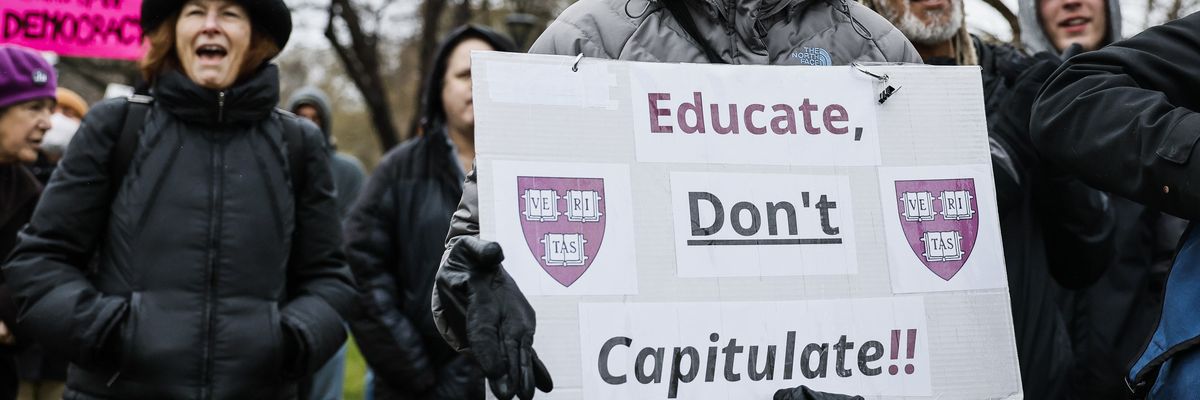A public statement signed by the presidents of more than 150 colleges and universities on Tuesday condemning U.S. President Donald Trump's "political interference" on campuses was notable not only for the higher education leaders who joined the call, said advocates—but for those who didn't.
The open letter, organized by the American Association of Colleges and Universities (AACU) and titled "A Call for Constructive Engagement," was hardly promoting "a radical idea," said the American Association of University Professors (AAUP) at University of Texas at Austin—but the school's president, Jim Davis, was not on the list of signatories.
UT-Austin was one of several where police violently cracked down on student protesters last year when campus demonstrations expressing solidarity with Palestinians facing Israel's U.S.-backed bombardment spread across the country.
A year after those protests took off, starting at Columbia University, the Trump administration has in recent weeks revoked the visas of hundreds of international students for their involvement in student activism, and has claimed to be fighting antisemitism by sending immigration agents to arrest student organizers including Mahmoud Khalil, Rumeysa Ozturk, and Mohsen Mahdawi, all of whom are still in detention and are being threatened with deportation.
"As leaders of America's colleges, universities, and scholarly societies, we speak with one voice against the unprecedented government overreach and political interference now endangering American higher education," reads the public statement released Tuesday, which was signed by university presidents and leaders including Felix V. Matos-Rodriguez of City University of New York, Maurie McInnis of Yale, Alan M. Garber of Harvard, and Christopher L. Eisgruber of Princeton.
"Our colleges and universities share a commitment to serve as centers of open inquiry where, in their pursuit of truth, faculty, students, and staff are free to exchange ideas and opinions across a full range of viewpoints without fear of retribution, censorship, or deportation," the statement continues.
The open letter came a day after Harvard University filed a lawsuit against members of the Trump administration and several federal agencies over the White House's $2.2 billion funding freeze and threat to have the school's tax-exempt status revoked—actions that could threaten crucial cancer research and other biomedical and scientific work.
"Our colleges and universities share a commitment to serve as centers of open inquiry where, in their pursuit of truth, faculty, students, and staff are free to exchange ideas and opinions across a full range of viewpoints without fear of retribution, censorship, or deportation."
The Trump administration's threats to Harvard came in response to the elite university's announcement that it would not comply with the president's demands to "audit its academic programs for viewpoint diversity," expel students involved in an altercation that happened at a pro-Palestinian protest in 2023, and end its recognition of Palestinian solidarity campus groups.
The university leaders who signed Tuesday's statement said they "are open to constructive reform and do not oppose legitimate government oversight."
"However, we must oppose undue government intrusion in the lives of those who learn, live, and work on our campuses," they said. "We will always seek effective and fair financial practices, but we must reject the coercive use of public research funding."
The statement also followed the passage of several resolutions by faculty senates at schools in the Big Ten Academic Alliance, led by Rutgers University, which was the first to call for a "mutual defense compact" last month—urging university leaders to commit to band together against Trump's incursion on college campuses and to share resources in the event of a direct attack on students or faculty at their schools.
"I am glad this finally happened," said Rutgers professor Todd Wolfson of the statement released by AACU. "AAUP has been calling for this letter for over a month. If your college or university president did not sign, you need to demand an answer."
Among those who should demand answers from university leaders, suggested some critics on Tuesday, were students and faculty members at Columbia University, whose acting president, Claire Shipman, did not sign the initial letter. Shipman added her signature later in the day on Tuesday.
Columbia allowed police to violently crack down on pro-Palestinian student protesters last year, revoked the degrees of some student organizers, refused to provide protection to Khalil and Mahdawi before their arrests, and at least one university trustee allegedly gave Khalil's name to the Trump administration before he was detained.
Those who did sign on to the statement warned that "the price of abridging the defining freedoms of American higher education will be paid by our students and our society."
"On behalf of our current and future students, and all who work at and benefit from our institutions," reads the statement, "we call for constructive engagement that improves our institutions and serves our republic."
Note: This piece has been updated to include a mention of Claire Shipman's signature , which was added to the letter later on Tuesday, April 22.




